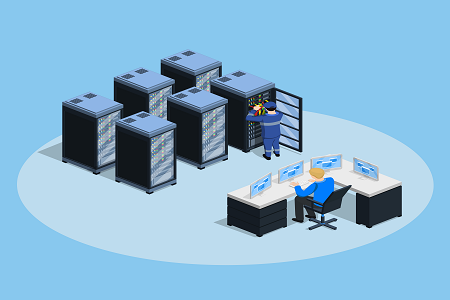Salient IT Services › Data backup services in Sacramento
What you need to know about data backup services in Sacramento
Taking good care of your data should rank high on any company’s list of priorities. Losing access to it, even for a short time, will impact your company’s productivity and hence its results. Permanently losing important data could have both legal and financial implications. Fortunately, you can protect against all this by implementing a rigorous data backup strategy. With that in mind, here is a quick guide to what you need to know about data backup services in Sacramento.
The old 3-2-1 strategy still holds good today
Most SMBs will find that it makes sense to stick to the time-honored strategy of keeping three copies of their data (including their production copy) over two media (which now includes clouds), with one copy being kept off-site (if you’re working in the cloud, that means in a second cloud).
It’s extremely risky to rely on your production copy plus a local data backup because that leaves you totally exposed if anything happens to or in your main location. If you’re using a public cloud and prepared to take a bit of a gamble on your cloud provider’s stability, then ask yourself if you’re also prepared to take a bit of a gamble against human error on your side.
Remember that in the public cloud, security is a shared responsibility. The provider does its best to protect its platform against external threats. The client (or “tenant”) has to secure their own access to it from misuse (accidental or deliberate) and also from compromise. This means that if you’re working in the public cloud, backing up your data is usually more for protection against human error (and malicious actors) on your side than it is about protecting you against failures on your cloud provider’s side.
At the same time, however, it’s risky to go overboard with the off-site data backups because each copy your take increases your exposure to potential data theft (and it also increases your operating costs without a corresponding increase in benefit).
The cloud is usually the only sensible place to hold your data backups

If you’re working in a data center, there may be a case for sticking with physical storage for your on-site data backups. Physical storage is a one-time purchase, which is currently very affordable, and since you’re running a data center you presumably have somewhere appropriate to keep it. If you’re working in a cloud, public or private, then, by definition, your local data backups will be held in the same cloud. In all environments, the cloud is usually the most sensible place to hold your off-site data backups, although the exact reasons will vary depending on your infrastructure.
If you’re in a data center then you have to choose between transporting physical media to an off-site storage location (for which there is usually an extra cost) and then having to retrieve them if you need them for a restoration. This typically negates most, if not all, the cost benefits of sticking with physical storage and the cloud has the clear edge on convenience, flexibility and speed regardless of whether you’re working out of your main data center or out of your disaster recovery location.
If you’re in a public cloud, then it’s hard to see a business case for doing anything other than storing your data backups in another public cloud, especially since it usually only takes a little extra work (and money) to turn this into a complete cloud disaster recovery solution. Even though the mainstream public cloud platforms have an excellent track record of keeping their services running, nothing is guaranteed and so it can be reassuring to know you have a very cost-effective Plan B.
If you’re in the private cloud, then life can get a little more interesting. You have at least two, possibly three options
1. Store your data backups in a public cloud and use this as your disaster recovery solution.
2. Store your data backups (encrypted) in a public cloud and connect it to both your main private cloud and a second private cloud which you use as a disaster recovery location.
3. Store your data backups in your second private cloud.
Option one may raise eyebrows and as you’ve probably guessed it was the “possible” option, but it is becoming an increasingly feasible prospect so if you really want to watch your budget this possibility may be worth at least a look.
At present, however, most SMBs will probably go for either option two or option three. If your priority is to reduce costs, then option two is usually best and if it’s to minimize time to recovery after a disaster, then option three is usually best.
If you’d like to speak to a reputable and experienced data backup services provider in Sacramento, please click here now to contact Salient IT.



